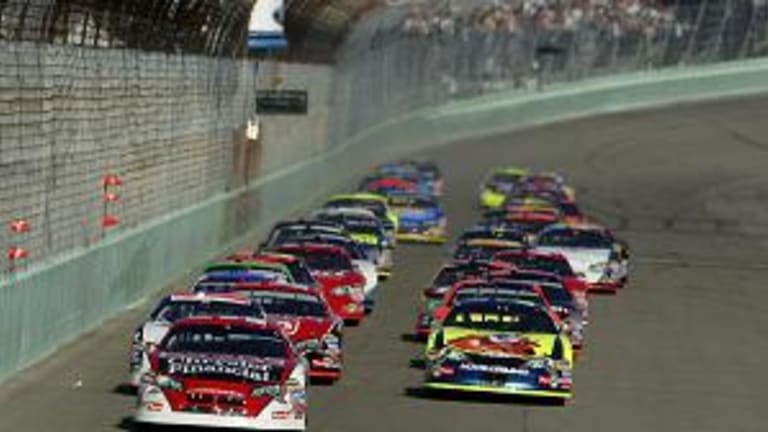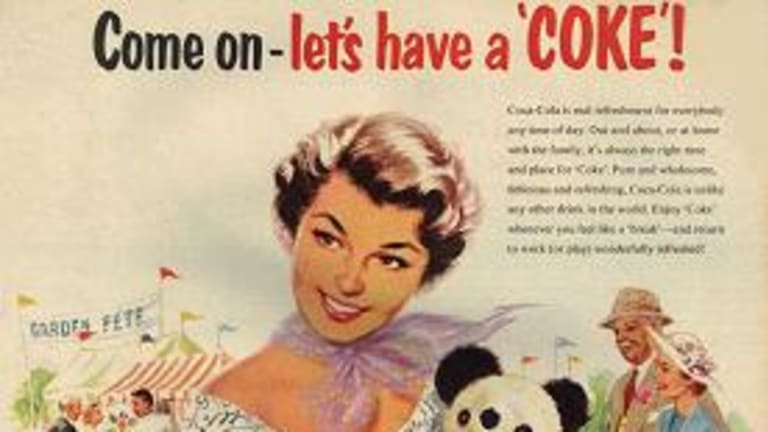While walking down Fifth Avenue this morning on my way to an appointment I passed an arresting sight: two Dodge NASCAR race cars, stationed at the curb, as some sort of publicity stunt for Dodge. Now I'm not a gearhead, although for a good portion of my life I rode fast, and I mean let's see if I can scare myself so bad that I puke fast, motorcycles. And have loved no machine more than the Orange Blossom, my 1953 Allis-Chalmers WD, wide-front tractor, which is slow, and I mean, let's see if I can make the 300 yards to the pond before I have to stop for lunch and a nap slow.
Pragmatists and Aesthetes
By Peter Bodo Nov 28, 2006Rome, Italy
Iga Swiatek defeats Aryna Sabalenka to win Rome and complete rare Madrid-Rome sweep
By John Berkok May 18, 2024Rome, Italy
Rome: Nicolas Jarry seeks Chile's first Masters 1000 title in 25 years after edging Tommy Paul
By TENNIS.com May 18, 2024Rome, Italy
Iga Swiatek vs. Aryna Sabalenka: What their Rome final could mean for their rivalry
By Steve Tignor May 17, 2024Style Points
All-black everything: Novak Djokovic to play in exclusive “Legend” racquet for rest of his career
By Stephanie Livaudais May 17, 2024Social
"Let’s try one more time": Dominic Thiem, Diego Schwartzman reunite ahead of Roland Garros farewells
By Baseline Staff May 17, 2024Betting Central
Pick of the Day: Aryna Sabalenka vs. Iga Swiatek, Rome final
By Zachary Cohen May 17, 2024Djokovic gets late wild card to Geneva Open in bid for more clay action before Roland Garros
By Associated Press May 17, 2024Rome, Italy
Alexander Zverev returns to Rome final with comeback win over Alejandro Tabilo
By Associated Press May 17, 2024ATP Geneva, Switzerland
Novak Djokovic accepts Geneva wild card after undergoing head scan for Rome injury
By TENNIS.com May 17, 2024Pragmatists and Aesthetes
Published Nov 28, 2006
Advertising

Nascars
© Getty Images
But I have to say that those NASCAR vehicles, ghastly plastered stickers and fake, paste-on headlights and all, were absolutely, drop-dead gorgeous - lean, vibrant, sculpted - the closest thing to "sexy" that I can think of in the inanimate world. In this, they strike a contrast to, oh, the much more New York-ish ipod, which is an evil, miniaturized refrigerator created to steal your soul while pretending to feed it, and let's not even talk about how it caters your deeply anti-social impulses and pushes you to the brink of abstraction-hood (I don't care what the spell checker says, the word stays!)
I make this point because it's somewhat related to the post by MMY that I am about to Fisk, which to some degree is about marketing and television. I say that you anyone who makes a determination about NASCAR without actually seeing an authentic car, or spending an afternoon in the infield of a race track, amid the smoke of burning tires and no less incinerated cheeseburgers, is incredibly presumptuous and woefully blind to the way that his or her own attitude has been shaped by exactly the same monsters (television and marketing) he may rail against. That is, the dissident position itself is being shaped by television and marketing. But unlike the advocate, the dissident can't even claim to have experienced that which he is railing against in any meaningful sense.
Wanna talk about prejudice?
Just a little way down the block, I passed a storefront called Otto Tootsie Plohound, which I assume is the practice of a commercial-minded Viennese post-Freudian psychiatrist who's turned the display window into a kind of Rorschach test, where you look at the bizarre items and say the first thing that pops into your mind. Why did I suddenly think, Buckeyes?
But let's get to the business at hand, MMY's original comment in the post below. I'm copying it in verbatim, and adding my thoughts in italics.
Pete:
I read your column again this morning -- and thanks for giving me so much to think about.
I find myself in a strange position here -- for years I watched tennis from outside the United States and wondered from 'afar' at the framing that American commentators imparting to the game. Now I live in the United States and I continue to look at the framing with wonderment.
While I agree that Roddick has in some ways 'earned' greater attention from the press due to his past GS win and his continued appearence in GS finals, I fail to 'get' why he is in any other way 'the man.'
I don't know that he needs to be 'the Man' in any other way, in that those are the ways that most count if you accept any objective standard of measure (that is, winning matches, as opposed to, say, attractive tennis). But in a deeper way, Roddick from Day One has demonstrated the single, most valued and admired attribute in a tennis player: competitive fire. You simply cannot appreciate the man adequately -and nobody says you must love him - if you reject or relegate to secondary status the most fundamental premise of competitive sports: you play the game to see who wins. To see who's better. Not prettier. Not smarter. Not more "representative" of some virtue or condition we admire or aspire to. Just better. And the way you tell that is by looking at the scores and results.
We've often split TennisWorld into two camps here: the pragmatists, who place a high value on a player's drive and ability to win, and the aesthetes, who place a high value on the way a man or woman plays tennis, a game regrettably saddled with this discomfiting thing called a scoring system. Occasionally, someone manages to please both camps. His name is Roger Federer.
To me Andy Roddick is an example of what is bad about American tennis coverage not because I personally find him to have the charisma quotient of my favourite armadillo or because I find his sex appeal to register in the same range as Kolya the Obscure but because Andy differs from a hundred other American sports stars only by being more wholesome and cleancut (tennis, others have noticed, is full of role models).
Advertising

Marman
© Getty Images
"Only" is an odd way to put it, and it's curious that you would link certain of Roddick's alleged assets to his being American. After all, "wholesome and clean cut" is a pretty appealing profile these days, and to none more so than the "typical" TW reader, who is probably more concerned with what might be called haute bourgeoisie values (sportsmanship, fair play, ethical awareness, social conscience, good manners and great taste in neckties) than fans of more popular sports. I think many of us love The Mighty Fed because he too is "wholesome and clean cut", albeit in a different cultural wrapper.
Andy makes tennis hard to sell because he is not distinctive, he is not different, he is not a fresh breath of air.
He challenges no conceptions -- he stretches no limits -- he adds nothing to the game.
It's interesting that someone whom you forcefully and repeatedly characterize as anodyne (did you use the term "white bread" somewhere?) elicits such strong emotions. The equation doesn't add up: If Roddick is so boring and lacking in charisma and sex appeal, who is he such a polarizing figure (as the comments below bear out?). And if Andy makes tennis such a "hard sell", why are the people whose business it is to sell putting him on TV? You may answer that it's because he's an American, or a frat-boy, but that's besides the point, which is: does he or doesn't he sell?
I must say, I'm not really sure what "conceptions" Roddick is supposed to challenge (which ones do, say, TMF or Justine Henin-Hardenne challenge)? You may say H2 challenges the conception that small people can't play in today's environment, but then I'd answer that Roddick challenges the conception that you need "special gifts and tools" to be a Top 5, Grand Slam winning player these days. Here's what Roddick has added to the game: a Grand Slam title and multiple runner-up finishes; an American Grand Slam champ (the only active one, presently) who plays a bread-and-butter game, competes fiercely, and presents an interesting contrast to the mix at the top. He also provides a great flashpoint for numerous prejudices, many of them having to do with the nation he's from, and his standing as representative of a certain type of "typically" American character. Meaning, you can either love Roddick or hate him because of what he represents. Seems a pretty good selling point to me. . .
Tennis is chock full of very interesting players who could never fit into the mold of what it was to be an American athlete. That is what tennis needs to go with -- what advertisers would call "it's unique selling point" -- it needs to brand itself as something other than a way to continue the same attitudes and outlooks while we wait for the REAL sports to begin.
I'm not sure I understand this paragraph, there seems to be an awful lot going on in it and I can't quite connect the dots. I don't know that anyone is demanding a surfeit of players in the mold of the "American athlete", and I'm not even sure it's accurate to call it a "mold." Isn't there just as much - or little - of a mold for, oh, Brazilian soccer stars? Romanian gymnasts? West Indian cricketers? South African rugby players?
You may be saying that the tennis should be promoting players who are the anti-thesis of the "American athlete" as a "unique selling point", but then why shouldn't, say, Brazilian television be promoting soccer players who are the anti-thesis of whatever it is that the rank-and-file soccer player there represents? That also would expand the market in a way that you appear to be promoting, no?
The international nature of the game may be a great selling point in theory, but it's unwise to ignore the marketplace and what it appears to be asking for, or to assume that some enlightened people ought to just step in and "correct" a market that doesn't conform to their collective taste. Is it better to sell what a certain set of power brokers has determined to be the "right"thing to sell (in which case, Andy Roddick and his fans get crucified on the cross of some ideologically driven idea of marketing), than to sell that which the most number of people appear to have an interest in buying, for reasons that speak for themselves in a "go figure" kind of way?
Advertising

Utk
© 2006 Getty Images
The other day I was rewatching ESPN coverage of a match from Shanghai. While IMPORTANT stuff was happening on the court the commentators were rabbiting on about American Football games. It was one of those moments when you scream (or at least I scream) out loud METACOMMUNICATION. Tennis is only important we are being told, to the extent that it is no different than any other really American sport -- to the extent that it is different we must change the nature of the sport rather than learn to appreciate its differences.
The other way to look at this, of course, is to see tennis as being injected into the mix with American football or Major League Baseball as a major sport, and isn't that a good thing? And it's a leap to go from linking tennis to other sports and assuming anyone wants to change it. The aesthetes are blind to one important fact here: for most people, most of the time, sports is about winning or losing, and games that are more or less appealing and fun to watch, for a variety of reasons ranging from the traditions they embody (Ohio State vs. Michigan; if you prefer, Real Madrid vs. Barcelona, if that's the right analogy) to the nature of the competitors and match-ups, to the intrinsic appeal of the way the games are played. In this sense, Roddick's simple, straightforward style may provide a narrative framework - especially in contrast to certain opponents - that actually enhances the viewer's appreciation of tennis.
During Wimbledon, every television in every bar and restaurant in the Village was tuned to World Cup soccer - not Wimbledon highlights. In the U.S. on a certain Sunday in January, every television in every bar and restaurant window is tuned to the Super Bowl. So what? Soccer and football are bigger than tennis, which doesn't diminish tennis one bit.
Or, to make an analogy -- to much of the discussion tennis coverage in the United States seems to involve telling us we need too put more ketchup on the sushi for fear that we taste the raw fish.
I understand the concept, I just don't agree with the analysis. Part of this seems to be driven (some of your later comments seem to support what I am about to write) by this notion that we are being force-fed things that we don't necessarily like, and that may not be a good, or at least the best thing, for us.
You know, I think the general construction that we are victims of marketing and schemes to sell us stuff we don't want or need is bogus. I think people are in many ways smarter (and in many ways dumber) than we generally assume. One way they're smarter, though, is that they know what they like, and that's rarely what marketers (or political operatives) are trying to shove down their throats. Think about this: when was the last time you really, truly went out and bought something because it was cleverly or even diabolically "marketed" to you? Now, when was the last time you actually regretted a purchase you made with a little push from marketers?And please, I'm not accepting the "subliminal" impact conspiracy theory here.
Advertising

Yummy
© Getty Images
My point is that we're not that dumb.
The marketing/PR industries are, to a far greater degree, economy drivers and capital generators (not to mention huge employers) than vaguely sinister entities that sell us good we don't want or need. Would that it were that easy for them!
The main goal of marketers, including tennis marketers, I think, is to get the product they are selling onto the radar of the public - by whatever means necessary. After that, it's all a crap shoot.
I've been bombarded with Pepsi ads all my life. Never bought a can of the stuff. I think I'm more rather than less like other people in this regard.
Well, MMY, it's been fun. Let's go scour around to see what we can come up with on Davis Cup!